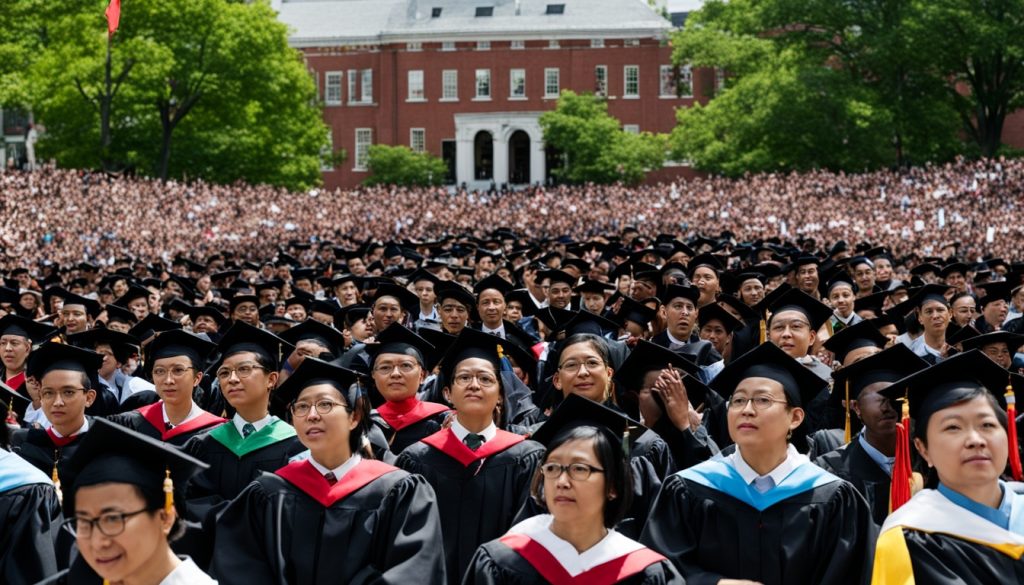At the Harvard commencement, many students left while chanting “Free, free Palestine.” They wore their graduation robes. This was a response to campus protests. Just a day before, Harvard said 13 students in a protest would not get their diplomas. The graduates made a strong stand on social justice with their protest during the prestigious event.
Key Takeaways
- Group of graduates walked out during Harvard commencement chanting “Free Palestine”.
- Protest occurred following a series of campus demonstrations.
- Event took place a day after Harvard barred 13 students from receiving diplomas.
- Action aimed to address social justice issues.
- Graduates used the prestigious ceremony as a platform for their message.
Overview of the Harvard Commencement Walkout – Group of graduates walk out of Harvard commencement chanting ‘Free Palestine
At the recent Harvard commencement, a group of graduates staged a significant walkout. They were chanting “Free Palestine.” This action was part of many campus protests related to the Gaza conflict and university investments. The protest highlighted 13 students not getting their diplomas because of a past protest.
Background of the Protest
This protest was part of a wider movement on campuses. Over 1,500 students signed a petition against the sanctions on the 13 students. About 500 staff and faculty also supported letting these students graduate. The protestors wanted the banned students to be allowed to join the ceremony.
The sanctions were put because the 13 students broke university rules during a pro-Palestinian protest. This protest was part of a national effort that led to over 3,000 arrests. The movement gained more attention when the University of California, Los Angeles Chancellor’s hearing was scheduled to discuss the protests.
Reaction from the Audience
The Harvard commencement was full of energy as the graduates walked out. The crowd called for the 13 students to be included, and many cheered. The speeches at the event supported the protestors and questioned Harvard’s stance on free speech and peaceful protests.
The audience’s strong support showed growing advocacy for student rights. It aimed at directing attention towards broader issues of fairness and university governance. The discussion about reviewing the sanctions proposed a possible path forward.
A positive example cited was at Drexel University, where a similar protest ended peacefully. This event was seen as a hope for how the issues at Harvard could be resolved.
For more information about the Harvard commencement and its implications, please visit here.
Reasons Behind the Protest
Harvard’s commencement faced deep concerns about justice, investments, and Gaza’s conflict. It focused on wanting a Gaza ceasefire and urging Harvard to stop supporting the war.
Calls for Ceasefire in Gaza
Thirteen Harvard students were at the heart of this, not allowed to get their degrees. They spoke loudly for a peace in Gaza. Around 1,500 students and nearly 500 staff joined them.
Push for Harvard to Divest from Certain Companies
Many wanted Harvard to stop investing in Gaza’s conflict supporters. They felt Harvard’s money should support good causes. Even after some support from the faculty, the 13 students faced a tough decision from Harvard’s top leaders.
Protesters put down their tents after making a deal to talk about the endowment. The protest’s seriousness was clear with actions like the flags flying and the truck’s messages.
These protests highlight the need for universities to invest in peace and justice worldwide.
Direct Impact on the Thirteen Students
After the protest, 13 students faced big changes because of their actions. They were not allowed to graduate as a result of Harvard’s policies. This made them unable to join the big day.
Blocked from Receiving Diplomas
These students got in trouble for joining a protest. As a result, they didn’t get their diplomas at the graduation ceremony. The school said it was just following the rules. But many people thought stopping them was too harsh.
Statements from Affected Students
Students didn’t like the rule that stopped them from graduating. Asmer Asrar Safi thought Harvard was just trying to quiet students who disagreed. They and others felt the school cared more about money than their voices against issues. They hoped to keep fighting for what they believe in, despite this setback.
| Impact | Details |
|---|---|
| Blocked Diplomas | 13 students barred from ceremony |
| Student Statements | Expressed concerns about Harvard policies |
| University Response | Enforcement of disciplinary actions |
Group of graduates walk out of Harvard commencement chanting ‘Free Palestine’
Recently, during the Harvard commencement, a group of grads marched out. They chanted ‘Free Palestine’ in solidarity. This was a reaction to the university’s treatment of 13 students who protested.
These students were barred from getting their diplomas. But they had a deal about this since May 14. More than 1,500 students signed a petition against this. Nearly 500 staff and teachers also backed them up. The unity of the grads carried a strong message during the protest at the commencement.
The graduates were not the only ones supporting Palestine. The chant ‘Free Palestine’ was heard widely, joining nationwide pro-Palestine efforts. These efforts have seen over 3,000 arrests on different campuses. At Harvard, a plane with Israeli and U.S. flags flew overhead, showing the global impact of the protest.
Later, Harvard’s top board agreed to allow the 13 students to graduate as recommended by the faculty. Yet, feelings about this issue remain intense in the Harvard community and outside.
| Protest Details | Numbers |
|---|---|
| Students petitioned regarding sanctions | 1,500+ |
| Staff and faculty support | 500 |
| Participants in nationwide arrests | 3,000+ |
By walking out and shouting ‘Free Palestine,’ these Harvard grads have made a strong stand. They show their big support for social justice and clear opinion on the conflict. This event is sure to be remembered.
Response from Harvard’s Administration
The Harvard administration responded to the walkout by enforcing university policies. These policies were outlined in the Harvard College Student Handbook. They focused on campus protests and civil disobedience.
University Policies and Sanctions
Harvard strictly followed its rules when applying sanctions. The sanctions were meant to keep order and protect the university’s values. Among the sanctions, students couldn’t get their diplomas at the ceremony. This decision caused a lot of talk among students and teachers.
Official Statements from Harvard Corporation
The Harvard Corporation made a statement about sticking to university rules. It stressed the need to follow disciplinary guidelines, even during protests. But, some people didn’t agree. They pointed out that letting students graduate was a promise made before. This has brought up a conflict between enforcement and previous agreements.
| Key Issue | Harvard’s Response | Impact |
|---|---|---|
| Sanctions | Applied per student handbook | 13 students barred from graduation |
| Official Statements | Emphasized policy adherence | Conflict with prior agreement |
Support from Fellow Students and Faculty
Harvard’s protests received a lot of support from students and faculty. This part explores the many ways they showed their solidarity. It mentions signing petitions, faculty endorsements, and holding special events on campus.
Petitions and Faculty Endorsements
More than 1,500 students signed petitions backing the protests. The goal was to push for quick reforms in how the university handles activism. Around 500 professors also lent their support through endorsements. They were keen on boosting student voices and making sure their issues got noticed.
Campus Solidarity Events
Several events on campus were dedicated to supporting the protests. These included rallies, teach-ins, and panel discussions. They offered a space for open talks and thought on the protest’s goals.
These occasions brought the campus together, showing strong unity. This unity aimed to tackle issues of social justice both inside and outside the university.
| Event | Participants | Key Activities |
|---|---|---|
| Solidarity Rally | 500+ | Speeches, chants, and live music |
| Teach-in Sessions | 300+ | Workshops and educational talks |
| Panel Discussions | 200+ | Expert panels and Q&A sessions |
Role of Student Speaker Shruthi Kumar
Shruthi Kumar was the student speaker at Harvard’s graduation. She talked about freedom of speech and protests in a powerful way. She didn’t shy away from the tough topics, like the 13 students who didn’t get diplomas because of the university’s actions.
In her commencement speech, Kumar focused on solidarity and freedom in academics. These ideas really connected with her listeners. People were moved by her and showed they were not happy with how the university handled things. Being the student speaker gave her a chance to speak out for those students hit by these policies.
“Our duty as graduates is to uphold the integrity of freedom of speech and to stand in solidarity with our peers who have been unjustly silenced,” Kumar declared, evoking applause and cheers from fellow graduates and attendees.
Kumar’s speech was more than a part of the ceremony; it was a turning point. It shone a light on the big topics of free speech and fairness. By talking about the students who were affected, she showed the power of student actions. She also spoke to the strong feeling of unity in the academic world.
| Key Highlights of Shruthi Kumar’s Address | Impact |
|---|---|
| Public acknowledgment of 13 barred students | Provoked strong crowd reaction |
| Focus on freedom of speech | Highlighted community discontent |
| Solidarity with affected students | Amplified messages of protest |
Message from Commencement Speaker Maria Ressa
Commencement speaker Maria Ressa talked about the importance of the freedom of the press. She also urged the students to stand up for their beliefs. She said it’s crucial for democracy to keep the fight going.
“Grit is built by being tested,” stated Ressa. “Your integrity is forged in the moments you choose to stand up for what you believe despite the odds.”
Ressa connected deeply with student activism in her speech. She praised recent acts, such as the Harvard walkout, for their character-building effects. These movements help define personal ethics and values.

Ressa also drew a line between worldwide press challenges and campus actions. She stressed the value of peaceful protests. These stood in solidarity with the Harvard community, including 1,500 students and nearly 500 staff who opposed sanctions.
She expanded to broader events, like the arrests at Drexel University pro-Palestinian camps. She also addressed the police presence at Harvard. These discussions aimed to show the impact of student voices and encourage their persistent activism.
“Remember, it is through your activism and the unwavering fight for belief that you contribute to a better world. Never underestimate the power of your voice,” Ressa affirmed.
Ressa’s speech highlighted both the importance of the freedom of the press and the courage to defend principles. Her words marked a significant moment at the commencement, inspiring the audience deeply.
Wider Impact on University Community
Harvard’s 373rd commencement faced a twist when many students walked out. This move had a big effect on everyone at the university. It showed the power of standing together and speaking out.
Increased Security Presence
The protest caused more security on campus. Because it was so big and loud, Harvard needed to be extra careful. This was to make sure everything stayed safe at future events. You could see a lot more police around, especially while honors were being given out.
Extended Discussions on Free Speech
The walkout sparked talks about free speech. Some people agreed with the protesters, while others thought it went against what the speaker Maria Ressa talked about. Her speech covered issues like the Israel-Hamas conflict. This made people think more about the right to protest and speak up on campus.
There was also talk about how the students and the school leaders communicated. At first, the students thought the school would let things slide and let all seniors get their degrees. But, in the end, 13 students weren’t allowed to graduate. This big misunderstanding made people doubt how well the school dealt with protests and free speech.
For more insights into how the community reacted and what they think about the university’s response, check out the Boston Globe’s detailed report. It dives into the event’s impact and layers, shedding light on this important situation.
| Event/Aspect | Details |
|---|---|
| Harvard’s 373rd Commencement | Attendance: 30,000 |
| 13 Student Protesters | Not permitted to receive degrees |
| Graduating Students Walking Out | Constituted a significant portion of attendees |
| Comparison to Other Universities | Larger and louder protest noted at Harvard |
Pro-Palestinian Encampments Nationwide
In the United States, many universities have seen an increase in Pro-Palestinian encampments and nationwide protests. This trend mirrors wider movements at places like Harvard. It shows a big change in what student bodies support, especially in terms of global social justice.
Similar Protests at Other Universities
Events at places such as Northwestern and Rutgers universities have followed this path. Students there brought their voices to large protests. They hope to see big changes made in how the Israeli-Palestinian issue is dealt with. These gatherings have created a strong web of activism, showing that student struggles are linked all over the country.
Outcomes of Nationwide Movements
However, the results of these nationwide protests have looked quite different. For some schools, there were productive talks and attempts to meet student needs. Yet, at other universities, police were called in. This shows there’s quite a bit of disagreement on how to treat demonstrations. It raises questions about how universities should respond to students’ calls for change.
Let’s look at outcomes at some renowned universities:
| University | Response Type | Protest Outcomes |
|---|---|---|
| Harvard | Sanctions | Blocked students from graduation, heightened discussions on free speech |
| Northwestern | Negotiations | Created ongoing talks, discussed new policies |
| Rutgers | Police Intervention | Increased security, talks with student leaders |
This comparison shows how the Pro-Palestinian encampments issue is complex and far-reaching. It’s part of a bigger story about student movements and their push for a fairer world.
Media Coverage of the Walkout
The Harvard commencement walkout caught the eye of both local and national news. This press made sure the protest’s message reached far and wide. It also led to a bigger talk among the public about the walkout’s goals.
Local and National News Outlets
News outlets like The Boston Globe, Washington Post, and CNN talked a lot about the walkout. They shared why it happened and how Harvard responded. They also covered what student activism means in the big picture.
This coverage shed light on the tensions at Harvard. It showed the clash between the school’s rules and what students want for a fairer world.
Social Media Reactions
People quickly took to social media to talk about the walkout. Hashtags like #FreePalestine and #HarvardWalkout were big on Twitter and Instagram. There, folks shared news, videos, and their thoughts, creating a lively global discussion.
This online chatter helped spread the protest’s message worldwide. It allowed people everywhere to join in the conversation about the walkout and the issues it raised.
| Media Outlet | Coverage |
|---|---|
| The Boston Globe | In-depth reporting on the walkout and interviews with students. |
| Washington Post | Analysis of the protest’s impact on university policies and national movements. |
| CNN | Live coverage and expert commentary on the implications for student activism. |
Criticism Faced by the Protesters
After the walkout at Harvard’s event, protesters faced a lot of criticism. The backlash wasn’t just about different opinions. It included accusations of antisemitism, adding more tension to the campus.
Accusations of Antisemitism
Some have accused the protesters of antisemitism, seeing their actions as hate speech. This debate has split people. Some say the protesters were fighting for social justice. But others find parts of the protest offensive.
Public Backlash
The accusations led to a strong public backlash. Social media and the news were full of different views. The situation not only divided people but also made campus tensions worse.
Moreover, a controversial billboard accused some protesters of antisemitism. This event deepened the already existing divisions further.
Comparative Perspective: Other University Responses
Looking at how universities handle pro-Palestinian protests shows different paths. Northwestern and Rutgers stand out by choosing softer ways over harsh discipline. This is unlike Harvard, which drew criticism for strict actions.
Approaches by Northwestern and Rutgers
Northwestern and Rutgers both prefer talking things out to strict punishments. At Northwestern, students protested peacefully, even doing sit-ins. Instead of punishing them right away, the school talked things through.
Rutgers also opted for a peaceful approach, choosing to understand why the protests were happening. This friendly way focused on talking things through instead of jumping to harsh penalties.
| University | Response Approach | Outcome |
|---|---|---|
| Harvard | Stringent Disciplinary Actions | Suspensions and Diploma Blocks |
| Northwestern | Negotiations and Dialogue | Continued Protest with less Confrontation |
| Rutgers | Understanding and Mediation | Managed Activism with Minimal Disruptions |
Implications for Campus Policies
Looking at how Northwestern and Rutgers dealt with things offers key lessons. Their focus on talking and understanding creates a smoother atmosphere for dealing with protests. Such an approach could become a guide for others seeking to manage conflict and keep the peace while respecting protest rights.
Their different approaches bring the importance of university policies to light. Harvard’s strict ways created tension, while Northwestern and Rutgers’ methods show the value of talking and finding middle ground. These show how discussion and understanding can solve student-led conflicts peacefully.
Personal Stories of Graduates
The recent campus protests have brought many personal stories to light. These stories show why graduates joined the protests. Each voice adds to a bigger story of fighting for change. This work marks their future and impacts everyone.
Individual Motivations for Joining the Protest
Graduates have unique reasons for taking part in protests. Some feel deeply about social justice. They are inspired by historical movements that showed the power of people’s voices.
Others feel a personal tug because of the specific issues the protests address. For example, Ahmed was motivated due to his family’s struggles in Gaza. This personal connection makes his story very powerful.
Many graduates also found strength in working together. The support of 1,500 students and 500 faculty members was key. It showed that a united effort can indeed bring change. Stories from these solidarity events highlight the power of standing firm for your beliefs, even when it’s hard.
Future Plans of the Graduates
Leaving Harvard, these graduates’ paths are changed by their protest experiences. Many wish to continue fighting for social justice. They hope to use their new skills and networks to make a difference.
Others are inspired to work in fields that reflect their values. For example, Sarah looks to make policy changes. She aims to tackle the main issues they protested against.
Their shared stories clearly show the protests’ lasting impact. It affected not just their actions now, but also their future plans. This ensures that the strong voice of their protest movement lives on for years.
For more on the Harvard commencement and student activism, see the detailed story here.
Further Repercussions and Next Steps
The Harvard commencement walkout aftermath triggered talks about the future impacts on students. It also brought up discussions about possible future appeal processes. The bar on 13 students from getting their diplomas has drawn significant focus.
Future Appeals Process
The Harvard Corporation hinted at a possible appeals process for those 13 students. They faced sanctions for joining the encampment protest. This could be a hopeful opportunity for the students to clear their academic records. It might also allow them to move forward with their schooling without a stain on their records.
Further conversations and negotiations are planned. They could show how future similar situations will be handled. This could set a guide for future incidents.
Long-Term Impacts on the Students
The sanctions’ long-term effects on the students are of great concern. People wonder how these outcomes will influence their careers and opportunities. And how it will affect their future as students. The encampments for Palestine resulted in over 3,000 arrests across the country, showing the serious side of student activism. There was a strong police presence at Harvard during the graduation, highlighting the tensions around the protests.
After talks with the school, Harvard protesters left and removed their encampment. This event shows the power of discussions in settling matters peacefully. It was a positive step, unlike incidents ended by police actions, seen in places like Northwestern and Rutgers. It points to the possibility of better approaches. The outcome of this significant event will influence future activism policies at universities. And, it will also affect student rights to protest.
Conclusion
A group of graduates shouted “Free Palestine” at Harvard’s commencement. This stands out in student activism and talks about social justice on campus. It showed the struggles the school faces in protecting policies and allowing student impact. The protest calls for peace in Gaza and for Harvard to stop working with involved companies.
The school dealt with the matter by sanctioning 13 students. This has sparked a big discussion. Some believe the sanctions are needed to keep things running well. Others think they’re wrong, saying it stops fair protest and expression.
This event from Harvard has a wider effect, reaching across the community. It shows how crucial it is to support student movements without making rules unfair. The protest has not only changed talks on campus, but it also influences other schools. It reminds us of how together, we can push for social change strongly.
FAQ
What caused the group of graduates to walk out of the Harvard commencement?
How did the audience react to the Harvard commencement walkout?
What were the main reasons behind the Harvard commencement protest?
What was the direct impact on the 13 students involved in the protest encampment?
How did Harvard’s administration respond to the protest?
What kind of support did the protest receive from students and faculty?
Who was Shruthi Kumar and what role did she play during the commencement?
What did commencement speaker Maria Ressa emphasize in her speech?
How did the Harvard commencement protest impact the university community?
What was the outcome of similar pro-Palestinian encampments at other universities?
How was the Harvard commencement walkout covered in the media?
What criticism did the protesters face?
How did other universities’ responses to similar protests compare to Harvard’s?
What personal motivations did graduates have for joining the protest?
What are the potential long-term impacts of the protest on involved students and university policies?
Source Links
Commencement Free Palestine Graduates Harvard University Political Activism Student Protest
Last modified: May 23, 2024






